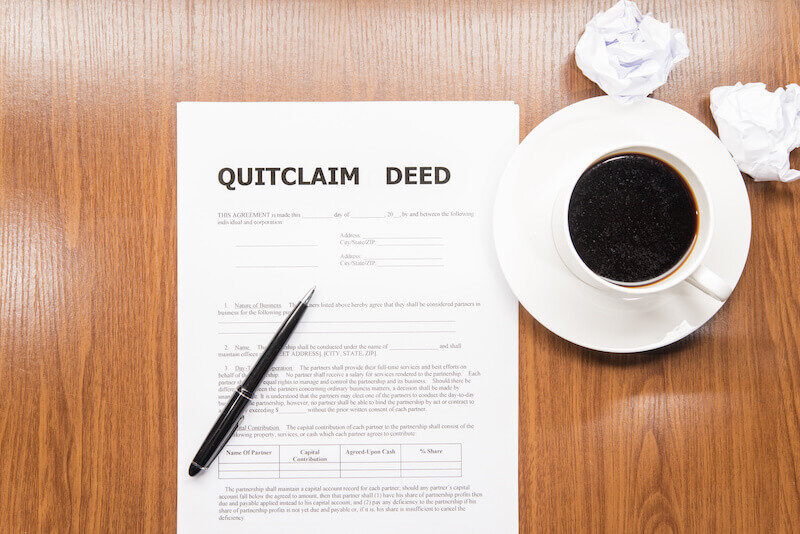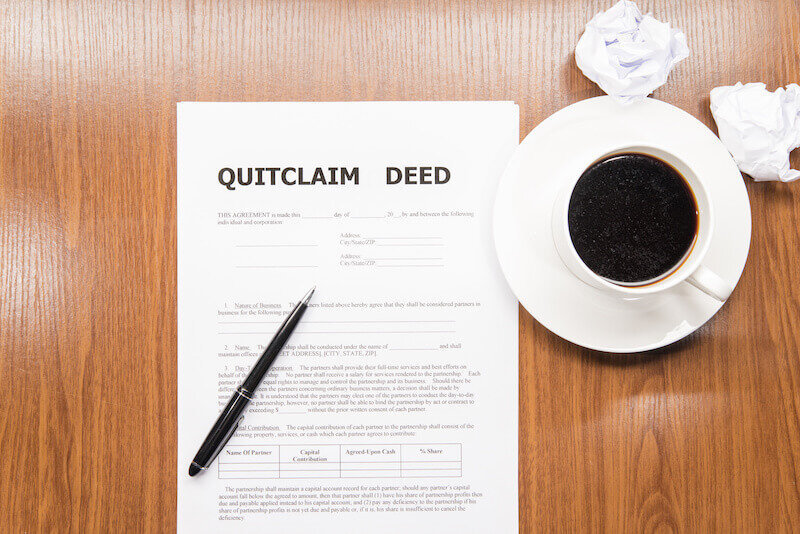 A quit claim deed is almost exactly what it sounds like: a deed used to transfer property where the owner quickly “quits” their claim to the property. It transfers property without any guarantees. Think of it as saying, “I’m giving you whatever ownership rights I might have – but I’m not promising I actually own anything.”
A quit claim deed is almost exactly what it sounds like: a deed used to transfer property where the owner quickly “quits” their claim to the property. It transfers property without any guarantees. Think of it as saying, “I’m giving you whatever ownership rights I might have – but I’m not promising I actually own anything.”
Unlike warranty deeds, a quit claim doesn’t guarantee the property is free from liens or that the seller actually owns it. It’s the simplest, fastest way to transfer property or titles, but comes with more risk for the buyer. If you’re struggling with the average time it takes to sell a house, quit claim deeds can come in handy. But they’re deceptively complicated and in the end you may find that there are better ways to sell your home fast in Oregon.
For informational purposes only. Always consult with a licensed real estate professional before proceeding with any real estate transaction.
Get a Cash Offer on Your Home With Cash Is King.
Want to skip the hassle of selling your home? We’ll make you a Guaranteed Cash offer. Get started now for free!
What Is a Quit Claim Deed?
A quitclaim deed works as a legal document that transfers whatever property interest a person has to someone else, without making any promises about the quality of those rights.
Unlike warranty deeds, quit claim deeds offer no guarantees that the grantor owns the property, that they have the right to sell it, or that the property is free from liens or other claims. The person signing the deed (the grantor) simply transfers whatever ownership interest they might have—which could be complete ownership, partial ownership, or no valid ownership interest at all.
This makes quitclaim deed works quick and simple to execute but potentially risky for buyers, which is why they’re most commonly used to transfer property between family members, during divorces and property partitions, or to clear up potential title issues rather than for standard property sales between unrelated parties.
If you’re looking to sell your home ASAP and the deal is rooted in trust and familiarity, using a deed to transfer property can be the way to go. However, their straightforward nature also means quitclaim deeds might not be suitable for all types of property transactions, especially where the legal history and status of the property’s title are complex.
Quitclaim Deeds vs. Warranty Deeds: Know the Difference
Before using a quitclaim deed to transfer property, understand how they compare to other deed types. The main difference comes down to guarantees about the property’s title.
With a general warranty deed, the seller (grantor) makes several promises:
- They actually own the property
- The title is clear with no hidden problems
- They’ll defend the buyer against any future title claims
Warranty deeds are usually what title insurance companies prefer. They offer the most protection for the new property owners.
Special warranty deeds offer a middle ground. The grantor guarantees they haven’t created any title problems during their ownership but makes no promises about what happened before they owned it.
A quitclaim deed offers no covenant proving anything about the title. The grantor simply transfers any interest they might have in the real property without promising they actually own anything.
Advantages and Risks of Quitclaim Deeds When Selling a Home
Quitclaim deeds present a mix of advantages and risks that buyers and sellers need to understand. Their simplicity makes them popular in certain scenarios, particularly within family contexts where trust already exists. However, this simplicity comes with complexities regarding the legal assurances about the property’s title.
Advantages of Quitclaim Deeds:
- They streamline the transfer process, particularly beneficial when transferring property between trusted parties like family members.
- They significantly reduce paperwork and speed up the overall transaction.
- They avoid the complexities of traditional property sales, especially useful for transferring property interests informally.
Risks of Quitclaim Deeds:
- There’s no guarantee the grantor actually owns what they’re transferring, which creates risk for the new property owners.
- They offer no protection against existing liens on the property or hidden title defects, which could lead to legal disputes.
- They’re generally unsuitable for transactions where a pre-existing relationship of trust doesn’t exist between the parties.
While quitclaim deeds work well for quick property transfers among family and friends, they carry risks due to the lack of protections typically offered by warranty deeds. The department of revenue still requires proper recording, and any property law issues remain with the property even after transfer.
Creating a Valid Quit Claim Deed in Oregon
To make a quit claim deed that actually works in Oregon, follow these steps:
- Get the right form. You can find Oregon-specific templates online or at office supply stores. Don’t use generic forms.
- Fill in the names exactly right. The person giving up rights (grantor) and the person receiving rights (grantee) must be named precisely as they appear on legal documents.
- Include the correct property description. Copy the legal description exactly from your property records. Small mistakes here can create big headaches.
- Sign with witnesses. In Oregon, you need the grantor’s signature plus two witnesses. All signatures must be notarized.
- Pay any required fees to the department of revenue. If your transfer isn’t between family members, you might owe transfer tax.
- Record the deed. Take the completed deed to the county recorder’s office where the property is located. Until it’s recorded, the transfer property process isn’t official.
Preparing to Sell a Home With a Quitclaim Deed
Selling a home with a quit claim deed is possible, but it’s rarely the best option. Here’s why:
A quit claim deed offers ZERO guarantees to the buyer that the land is indeed owned by the seller.
Most buyers won’t accept this arrangement. Without guarantees, they could end up with serious problems like:
- Discovering liens against the property
- Finding out other property owners have claims
- Inheriting title defects they’ll have to fix
If you do find a buyer willing to accept a quit claim deed, here’s how it works:
- Create the deed. Include the names of seller (grantor) and buyer (grantee), the legal property description, and language stating you’re transferring whatever interest you have.
- Set your price. Since you’re offering no guarantees, expect a significantly lower price than market value – sometimes 50-70% less.
- Sign with proper witnesses. In Oregon, you need your signature plus two witnesses, all notarized.
- Record the deed. The buyer typically takes the signed deed to the county recorder’s office and pays the recording fee.
- Handle the money separately. The deed doesn’t address payment, so you’ll need a separate agreement for the purchase terms.
The real estate agent handling your transaction may advise against using a quitclaim deed. If you’re really in a hurry to sell your house, quit claim deeds are rarely the way to go. In most cases, you’ll find more benefits when selling for cash.
Legal Considerations and Closing the Sale
When selling property with a quitclaim deed, understand it transfers ownership but doesn’t clear existing debts or liens on the property. Always consult a real estate agent or attorney who can guide you through property law complexities, resolve title issues, and ensure compliance with local laws.
Be completely transparent with your buyer about the property’s condition and limitations of the quitclaim deed. Carefully manage the closing process by preparing properly signed documents, handling the money transfer correctly, and recording the deed at your county office to make the sale official and avoid future complications.
Remember that title insurance companies often won’t issue policies for property transferred through quitclaim deeds, which can create problems for buyers trying to get financing.
Tax Implications When Using Quitclaim Deeds
When you transfer property using a quitclaim deed, don’t forget about tax considerations. The transfer might trigger capital gains taxes if you’re selling property that has appreciated in value since you acquired it.
Unlike inherited property, which gets a “stepped-up” tax basis, property transferred through a quitclaim deed might not receive the same tax treatment. The new owner typically assumes your original tax basis, which could mean higher capital gains taxes when they eventually sell.
Always consult with a tax professional before transferring property with a quitclaim deed to understand how it might affect both your tax situation and the recipient’s.
When Selling With a Quit Claim Deed Actually Makes Sense
Family Property Transfers
Transferring to a family member often works well with quit claim deeds, especially if you’re selling an inherited house. When parents sell to adult children or transfers happen between siblings, the family relationship usually means there’s already trust and knowledge about the property’s history.
Investment Property Flips
Real estate investors sometimes use quit claim deeds when selling to other investors. Both parties understand the risks and typically do their own title research. The buyer usually gets a discount on price in exchange for accepting the higher risk.
Clearing Title Problems
If you have a partial interest in property and want to sell that interest to co-owners, a quit claim deed makes perfect sense. For example, when divorced spouses want to remove one person from the title, a quit claim deed is the simplest way to transfer property interest to the remaining owner.
Distressed Properties
When selling severely damaged or distressed properties “as-is” to cash buyers, quit claim deeds sometimes make sense. The buyer knows they’re taking on risk and typically pays a much lower price, accounting for both the property condition and the lack of title guarantees. Taxes will still apply if you sell for less than market value.
Small Value Transfers
For very low-value properties like small vacant lots in rural areas, the expense of title searches and warranty deeds might not make financial sense. In these cases, a buyer might accept a quit claim deed if the purchase price is low enough to justify the risk.
Alternatives to Selling With a Quitclaim Deed
If you’re thinking about selling your property, a quitclaim deed isn’t always the best option. Here are better alternatives that offer more protection for both you and the buyer:
- General Warranty Deed – Provides the most protection for buyers by guaranteeing you own the property, the title is clear, and you’ll defend against any future claims
- Special Warranty Deed – Offers a middle ground where you guarantee no title problems occurred during your ownership (but makes no promises about earlier issues)
- Bargain and Sale Deed – Implies you own the property without explicitly guaranteeing it; offers more buyer confidence than a quitclaim deed
- Selling through a Title Company – Uses proper title searches and insurance to protect both parties and facilitate a clean transfer with appropriate deed types
- Cash Home Buyer Companies – Professional buyers who handle title issues and necessary documentation themselves and often use warranty deeds for the final transfer
- Owner Financing with Land Contract – Allows you to sell without immediately transferring the deed; once payments are complete, you transfer with a warranty deed
- Selling with Real Estate Agent – Professionals guide you through proper deed preparation and ensure legal compliance while finding qualified buyers
- Transfer-on-Death Deed – For estate planning purposes, allows property to transfer outside probate while maintaining your ownership during your lifetime
- Selling through Probate – When inheriting property, following proper probate procedures often results in cleaner title transfers than using quitclaim deeds
- Trust Transfer Deed – Moving property into a trust provides both asset protection and smoother eventual transfer to beneficiaries
Navigating Quitclaim Deed Sales Successfully
Selling a property via a quitclaim deed presents unique considerations and opportunities. This method is particularly beneficial for rapid transfers without the formalities of warranties on title status. Despite its simplicity, it’s vital for sellers to clearly communicate the deed’s nature and for buyers to conduct proper due diligence.
Selling a house with a quitclaim deed can be a strategic choice under the right circumstances, streamlining the transfer of property rights. This approach emphasizes the importance of clear understanding and careful planning in real estate transactions.
Remember that while quitclaim deeds transfer property quickly, warranty deeds are usually the safer option when selling to unrelated buyers. If you’re unsure which deed type is right for your situation, consult with a real estate professional who can guide you through the process.
For informational purposes only. Always consult with a licensed real estate professional before proceeding with any real estate transaction.
Get a Cash Offer On Your Home
No Commission. No Hassle. You pick the closing date.
CashIsKing.com works with cash investors on a daily basis and partners with investors who can deliver quick cash offers on properties of all conditions and locations. Why wait? Get a cash offer from an investor today!
Get a Cash Offer

